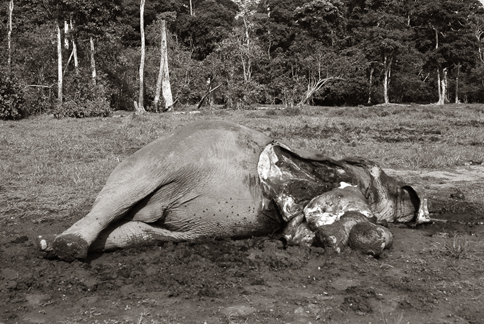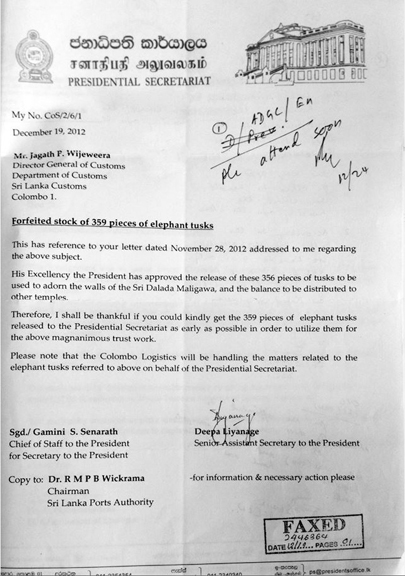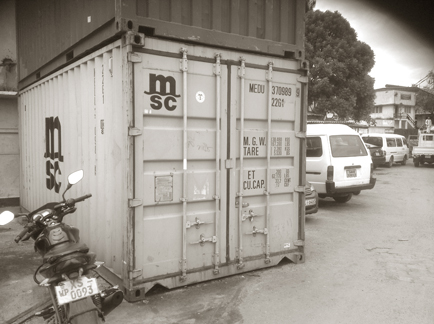Unwilling to walk the talk?
Sri Lanka’s failure to destroy the confiscated
consignment of blood ivory is earning the country a bad reputation:
by Dhaneshi Yatawara
 The
container load of confiscated elephant tusks slated for disposal three
years ago, continue to occupy space at the container yard of the Sri
Lanka Customs, earning the country a reputation of being unwilling or
unable to walk the talk. The detection of 359 pieces of tusks, weighing
nearly 1.5 metric tonnes, was made on May 12, 2012 when the container
transiting through Colombo was detained on a tip-off received by the
Customs Central Intelligence Unit. The estimated worth of the illegal
consignment was nearly Rs. 370 million. The
container load of confiscated elephant tusks slated for disposal three
years ago, continue to occupy space at the container yard of the Sri
Lanka Customs, earning the country a reputation of being unwilling or
unable to walk the talk. The detection of 359 pieces of tusks, weighing
nearly 1.5 metric tonnes, was made on May 12, 2012 when the container
transiting through Colombo was detained on a tip-off received by the
Customs Central Intelligence Unit. The estimated worth of the illegal
consignment was nearly Rs. 370 million.
The tusks were sawed off from brutally murdered African elephants.
Environmentalists charge that in delaying the disposal of the
confiscated loot, Sri Lanka has failed to send a strong message against
the merciless massacre of elephants.
The consignment of tusks was forfeited on October 3, 2012 following a
formal investigation by the Sri Lanka Customs. Tests done by the
Interpol, in an American Forensic lab, revealed the tusks were from
elephants in Tanzania.
High praise
At the time of the detection, Sri Lanka received high praise from the
international community for its smart move in breaking one avenue of an
illegal trade. However, failure to carry through with the decision to
destroy the consignment has reversed the sentiment. “The Government not
taking any action so far to destroy the blood ivory is damaging the
country’s image, especially at a time when the new government is trying
to rebuild the international image,” pointed out Samantha Gunasekara,
environmentalist and former Director, Sri Lanka Customs Bio Diversity
Division.
Reportedly, the topic had been discussed at the Convention on
International Trade in Endangered Species (CITES) held in Bangkok in mid
March 2013, with the then government drawing criticism for its alleged
move to retain the confiscated consignment of blood ivory, in
contravention of the established procedures of disposing of seized ivory
as regulated under the CITES. The previous government is accused of
attempting to use the stock of confiscated ivory to adorn the walls of
the Dalada Maligawa and other temples, in a move euphemistically
described as ‘magnanimous trust work’. In fact, the former President had
ordered the release of the tusks for this purpose in a letter dated
December 9, 2012 and signed by Gamini Senerath, addressed to the
Director General Customs, Jagath Wijeweera and relevant officials.
Hypocritical
The uncouth move renders hypocritical Sri Lanka’s CITES obligations
and makes it near complicit in facilitating the black market operatives
using the country as a free port for their ‘business’.
According to the World Wildlife Fund (WWF), illegal wildlife trade
has grown into an industry that earns billions of dollars a year, making
it the fourth largest global illegal activity after drugs,
counterfeiting and human trafficking.
|

Letter ordering the release of the ivory stock |
According to the findings of the International Fund for Animal
Welfare, it is ahead of the illegal trade in gold, small arms, oil and
diamonds. The situation is much worst now as present day poachers are
more organized and have better weapons so that they can, and do kill
whole families at a time.
Lessons from the Far East
In 2013 the government of Philippines destroyed nearly three metric
tonnes of blood ivory as the government was working to shed its image as
a major transport hub for illegal ivory. Philippines is cited as one of
nine countries considered as ‘priority concerns’ because they were used
as a smuggling hub for illegal ivory.
A significant amount of blood ivory was also destroyed by China in
the recent past, despite the country being accused of using these
illegally acquired elephant tusks for numerous uses, ranging from
medicinal to superstitious.
Hong Kong is another country of the region, which established its
name against illegal wildlife trade by destroying nearly 12 metric
tonnes of seized blood ivory. The latest display of burning confiscated
ivory was in Kenya where 15 metric tonnes were destroyed in public by
the Kenyan Government.
Sri Lanka is compared in such a background, said Gunasekara, adding,
“Despite the errors made by the previous Government, at least by now,
correct action should have been taken without delay by the new
government.”
Methods of disposal
There are three options defined in the CITES guidelines for the
disposal of elephant tusks forfeited by Customs and other authorities in
the world. One option is to burn the stock of blood ivory in public to
garner public attention, make the public aware and break the chain of
illegal ivory market. Burning can be done in three ways – crushing and
burning, burning using firewood or in an incinerator.
The second option is to return the stock to the owners in the country
of origin.
The third is to store the stock of blood ivory for educational and
research purposes.
No legal owner
In the context of Sri Lanka’s detection and detainment, the second
option, returning to the owner, cannot be done as there is no legal
owner. Sri Lanka Customs has retained three pieces for their museum at
the head office.
In a move that showed things wouldn’t be changing in the near future,
a March 2015 discussion between officials of the Presidential
Secretariat, Finance Ministry, Sri Lanka Customs and the Department of
Wildlife Conservation, on destroying the consignment of blood ivory in
public, saw the decision being deferred once again. Following the
discussion, the Sri Lanka Customs had in writing strong suggested to the
Finance Ministry that the consignment of elephant tusks need to be
destroyed in public, if Sri Lanka is to build up a good image.
“The Customs has all the powers by law to take a decision on this,”
said Spokesman for the Sri Lanka Customs and its Director (legal) Leslie
Gamini.
|

The confiscated container with the ivory consignment |
The previous Government’s demand, requests from temples and the
opposition from environmentalists and community groups is holding back
the customs from taking a decision. “We do not want to create disharmony
among people where we clearly see opposing ideas,” he explained.
Violating principles
According to the Customs, most of these tusks are singles and cannot
be made into a pair. Some of the tusks have been cut into pieces and
customs officials are of the view that the tusks cannot be exhibited in
temples, as traditionally, tusks are exhibited in pairs.
Commenting on the requests from temples for these elephant tusks,
Secretary of the National Sangha Council, Ven. Pahiyangala Ananda Sagara
Thera said it was a shame to see bhikkhus violating the basic principles
of priesthood.
“We come to the ‘sasana’ making a vow to leave behind the greed for
all the worldly pleasures in order to achieve enlightenment in life, in
this sansara,” Anandasagara Thera said, adding, “We as Bhikkus should be
compassionate to all living beings on this earth like a mother loves her
son unconditionally”.
Anandasagara Thera said it is bhikkhus who should be in the forefront
to work against harming any living being, even a wild animal. “Temples
really do not need items like ivory.
If a monk requests these items, it shows that he is going against the
teachings of Buddha and trying to embrace an aristocratic life instead
of a humble one,” he stressed. |

